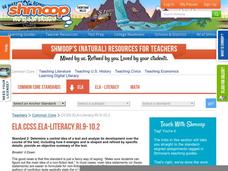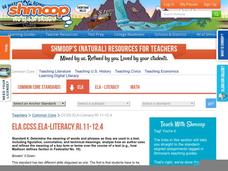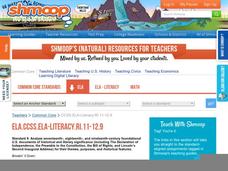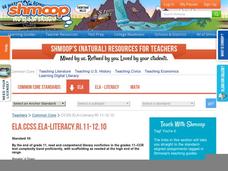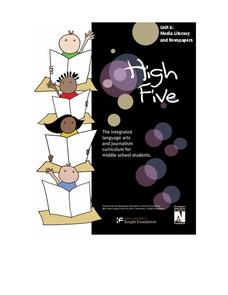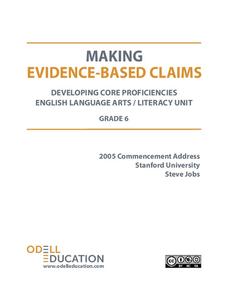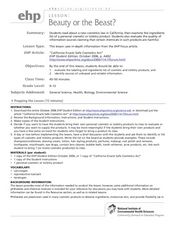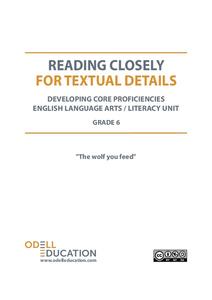Schmoop
ELA.CCSS.ELA-Literacy.RI.9-10.2
Although the ideas on how to implement the skill RI.9-10.2 are lacking, the assessment would work well for challenging learners to summarize, and identify the main ideas of presidential speeches that are of similar topics. One could use...
Shmoop
ELA.CCSS.ELA-Literacy.RI.9-10.8
Your learners need to develop skills to argue effectively, and this comes by understanding the traditions that make claims valid, and what detracts from their effectiveness. Although this resource does not give advice on how to teach...
Shmoop
ELA.CCSS.ELA-Literacy.RL.11-12.5
What would happen if I structured this review by beginning in the middle of it? Or by flashing back to the dinner I had last night that gave me bad heartburn, and then transitioned into how the lingering burn of acid seeped into my...
Shmoop
ELA.CCSS.ELA-Literacy.RI.11-12.4
Determining the meaning of a word based on context clues or marking how the meaning of a term evolves in the course of a document can be a challenge in more complex text. Give your pupils an opportunity to practice this skill with a...
Shmoop
ELA.CCSS.ELA-Literacy.RI.11-12.9
Guided by close-reading questions, groups examine the similarities and differences between the Declaration of Independence and the Bill of Rights. In addition, they look at how the principles are presented in these two foundational US...
Shmoop
ELA.CCSS.ELA-Literacy.RI.11-12.10
Assess whether your class members can comprehend complex informational text with a series of drills based on selections from Emerson, Thoreau, and G.K. Chesterton. The exercises could also be used for group work or a full-class discussion.
Shmoop
ELA.CCSS.ELA-Literacy.W.9-10.1
If you need an introduction to skill W.9-10.1 for writing, then you’re off to a good start here. Included is a funny script that introduces what the students need to know to conquer the skill. It also provides an introduction activity...
Shmoop
ELA.CCSS.ELA-Literacy.RL.11-12.6
It ‘s assessment check list time, and you have nothing to prove that your learners mastered the skill RL.11-12.6. Rest assured, here is a plan that is sure to appease your administrator. It offers solid examples on the difference between...
Shmoop
ELA.CCSS.ELA-Literacy.SL.9-10.3
Don't let your pupils take everything at face value! They should analyze and evaluate what speakers say. Practice this skill with the two related activities described here. After brainstorming critical questions, learners can listen to...
American Press Institute
High Five: Media Literacy and Newspapers
Teach the five different types of media with the first of three in a media literacy unit. Learners create and propose a final newspaper project, which must address information covered throughout the unit.
Curated OER
Smogasbord
When your environmental or earth science class is studying air pollution, you will want to take the time to go over this resource. Pupils peruse the history of air pollution regulations and examine outstanding diagrams of what...
Curated OER
What Science Suggests About 'Weather Weirding'
Here is an activity that you can use to help upper elementary or middle schoolers to meet Common Core literacy standards for science and technology. Youngsters read the article on extreme weather patterns, "Weather Runs Hot and Cold, So...
Curated OER
Mission Complete, Houston
It was a bittersweet event when the space shuttle Atlantis touched down for the last time on July 21, 2011. Space science learners read an article about this event in The New York Times and then write answers to who, what, where, when,...
Curated OER
2011 Nobel Prize Winners Announced
This assignment has young scientists read four different news articles about the 2011 Nobel Prize winners. Six questions are posed for children to write the answers. It is a relevant activity for getting middle schoolers to meet the...
Dr. Seuss Enterprises
Dr. Seuss in the Classroom
Explore the works of Dr. Seuss, such as Horton Hears a Who, Horton Hatches and Egg, The Sneetches and Other Stories, The Lorax, The Butter Battle Book, and Yertle the Turtle and Other Stories. Each story lesson includes reading...
Odell Education
Making Evidence-Based Claims: Grade 6
In order to make evidence-based claims, one must be able to draw explicit information from text. From here, learners take that information, analyze the text to develop a deeper understanding, and connect with the information in order to...
Curated OER
Mapping Your Identity: A Back-To-School Ice Breaker
Identify the unique personal attributes of your class members. Begin by viewing the Visual Thesaurus and discussing displayed attributes associated with famous American leaders. Using these identity maps as models, pupils generate nouns...
National Research Center for Career and Technical Education
Information Technology: Photoshop Scale
Scaling is a practical skill as well as a topic to be addressed throughout the Common Core math standards. You are given three different presentations and a detailed teacher's guide to use while teaching proportion, as well as practice...
Curated OER
Beauty or the Beast
Does the FDA really intend to protect public health? Spark a debate in your chemistry or health class by using this article, titled "Beauty or the Beast." It questions the safety of cosmetics and toiletry products, govenment regulations,...
EngageNY
Grade 9 ELA Module 3, Unit 1, Lesson 1
Clear up the misconceptions about autism and individuals on the autism spectrum with an inquiry-based instructional activity. As ninth graders read the first four pages of Temple Grandin's Animals in Translation: Using the Mysteries of...
Curated OER
Choosing Words Carefully
Use literacy tools to select precise vocabulary. High schoolers respond to discussion questions that require them to consider the denotation and connotation of words. They then read non-fiction passages and identify words in the passages...
Odell Education
Reading Closely for Textual Details: Grade 6
Close reading doesn't mean to literally read text close to your face, but rather to pay attention to particular details in order to develop a deep and purposeful understanding of text. The first part of a five-part resource provides an...
Howard Hughes Medical Institute
Gorongosa: Making Observations Activity
Do you have young scientists wanting to make new discoveries rather than just completing the same experiments? Young scientists use their observational skills to identify animals and patterns in animal behavior. Through tracking...
Shmoop
ELA.CCSS.ELA-Literacy.SL.11-12.2
One way to get your class to evaluate and synthesize multiple multimedia sources is through a research project. The idea here is that class members will watch videos and listen to scientific debates in order to create a casebook about...


